Oncology Brothers: Practice-Changing Cancer Discussions
The Oncology Brothers Podcast, led by Drs. Rahul and Rohit Gosain, is dedicated to bridging the gap between academic cancer centers and community oncology in the ever-evolving field of hematology & oncology. With a mission to disseminate crucial information to the medical community, this oncology podcast is not for medical advice but rather serves as a beacon for physicians, nurses, trainees, and advanced practice providers (APPs) involved in the care of cancer patients. Drs. Rahul and Rohit Gosain, both esteemed oncologists, bring a wealth of experience and expertise from their general community practice to these discussions. Through short and engaging interviews with world-renowned researchers, clinicians, hematologists, and oncologists, they present practice-changing data in a concise, bite-sized format. Get the latest FDA approvals news, oncology conference highlights, and treatment algorithms in 25 minutes or less. Conversations center around common cancers you see in your clinic like breast cancer, prostate cancer, kidney cancer, bladder cancer, lung cancer, and GI cancers. With new indications and approvals, we talk about how to incorporate this data in your day to day clinical practice. Each episode includes visual presentations so you can follow along within the podcast players and on YouTube @oncbrothers. These visual tools and algorithms will provide an outline on what is covered in each episode. Immediately apply the latest insights and advancements in your daily practice, ensuring the delivery of optimal cancer care to patients within your local communities. If you want to navigate the complexities of your hematology & oncology practice and stay current, the Oncology Brothers Podcast offers invaluable insights and practical takeaways to enhance your professional journey and improve patient outcomes. For more information, please visit: www.oncbrothers.com, and connect with us on Twitter/X/Instagram/TikTok: @oncbrothers, or email us at info@oncbrothers.com
Episodes
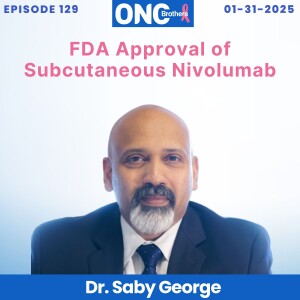
Friday Jan 31, 2025
Friday Jan 31, 2025
Welcome to the Oncology Brothers Podcast! In this episode, Drs. Rohit and Rahul Gosain are joined by Dr. Saby George from Roswell Park Comprehensive Cancer Center to discuss the recent approval of subcutaneous nivolumab based on the CheckMate-67T study.Join us as we delve into:• The study design and findings of CheckMate-67T• The implications of subcutaneous nivolumab for patients and healthcare providers• Safety signals and side effects associated with the new formulation• The significant time savings for patients receiving treatment• Real-world experiences from patients involved in the trial
This episode highlights how the subcutaneous formulation of nivolumab can enhance patient care by reducing time spent in infusion centers while maintaining efficacy and safety.
Tune in to learn more about this exciting advancement in cancer treatment and its potential impact on patient quality of life! Don't forget to like, subscribe, and check out our other episodes for more insights on FDA drug approvals, conference highlights, and treatment algorithms. We are the Oncology Brothers!
YouTube: https://youtu.be/4blP8jqizUQ
Follow us on social media:• X/Twitter: https://twitter.com/oncbrothers• Instagram: https://www.instagram.com/oncbrothers
Subscribe to our channel for more insights on oncology treatments and patient care!
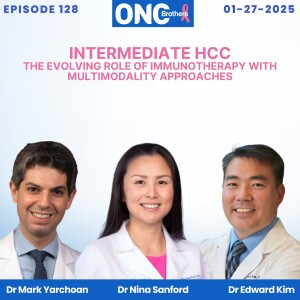
Monday Jan 27, 2025
Monday Jan 27, 2025
In this final episode of the four-part series on hepatocellular carcinoma (HCC), hosted by the Oncology Brothers, Drs Rohit and Rahul Gosain, the discussion focuses on the evolving role of immunotherapy (IO) in intermediate HCC.
The episode explores multimodal approaches that combine IO and IO-based therapies with loco-regional treatments and highlights the essential role of a multidisciplinary care team.
Drs Nina Sanford (radiation oncologist), Mark Yarchoan (medical oncologist), and Ed Kim (interventional radiologist) join the Oncology Brothers to share their insights on:
• Current treatment options for intermediate HCC, addressing its heterogeneity and standard treatment pathways
• Latest clinical trial data (EMERALD-1, LEAP-012) on combining IO with loco-regional therapies, and the clinical implications
• The importance of effective collaboration within the multidisciplinary team for delivering optimal patient care
• Combining IO with loco-regional therapy and future perspectives in the field
Clinical takeaways
• IO and IO-based treatments are moving earlier in the treatment paradigm for patients with intermediate HCC. Earlier integration of these therapies aims to achieve improved systemic control, allowing loco-regional therapy to target oligoprogression, residual lesions or reduce tumour burden
• Emerging data supports combining systemic and loco-regional therapies for patients with intermediate HCC. EMERALD-1 and LEAP-012 show promising PFS data using IO-based combination regimens like durvalumab + bevacizumab or pembrolizumab + lenvatinib alongside TACE. Long-term OS data are awaited
• Effective communication and coordinated care among specialists, such as medical oncologists, radiation oncologists, hepatologists, and interventional radiologists, are essential to developing optimal treatment strategies for patients with intermediate HCC
Follow us on social media:
• X/Twitter: https://twitter.com/oncbrothers
• Instagram: https://www.instagram.com/oncbrothers
• YouTube: https://www.youtube.com/channel/UCjfxKlVho5xWH5ltufj4F4A/
Subscribe to our channel for more insights on oncology treatments and patient care!

Wednesday Jan 22, 2025
Wednesday Jan 22, 2025
Welcome to another episode of the Oncology Brothers podcast! In this episode, Drs. Rahul and Rohit Gosain are joined by Dr. Pashtoon Kasi from City of Hope to discuss the management of side effects associated with key treatments utilized in colorectal cancer, but also in other tumor types.
We dived deep into two important drug classes: Bevacizumab, an anti-VEGF antibody, and the anti-EGFR antibodies, Panitumumab and Cetuximab. Dr. Kasi provided a comprehensive overview of these targeted therapies, their mechanisms of action, and the common side effects that patients may experience.
Key topics covered in this episode included:• Overview of Bevacizumab and its side effects, including hypertension, proteinuria, and risk of bleeding.• Clinical pearls for managing side effects associated with Bevacizumab.• Discussion on the skin toxicities, nail changes, and electrolyte imbalances related to Panitumumab and Cetuximab.• The importance of preemptive strategies in managing skin rashes and other side effects.• Insights into infusion reactions with Cetuximab and considerations for patient safety.
Join us for this informative discussion that aims to enhance your understanding of these critical therapies and improve patient outcomes.
Follow us on social media:• X/Twitter: https://twitter.com/oncbrothers• Instagram: https://www.instagram.com/oncbrothers
Don't forget to check out our other episodes in the Tox Check series, where we explore antibody-drug conjugates and CAR T therapies.Subscribe to our channel for more insights on oncology treatments and patient care!
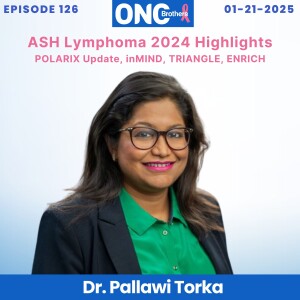
Tuesday Jan 21, 2025
Tuesday Jan 21, 2025
Welcome to another episode of the Oncology Brothers podcast! In this episode, hosts Drs. Rahul and Rohit Gosain are joined by Dr. Pallawi Torka from Memorial Sloan Kettering Cancer Center to discuss the latest highlights from ASH 2024, focusing on key studies in lymphoma.
In this episode, we dive into:• POLARIX Study: An update on the POLARIX trial, exploring the use of Polatuzumab in frontline diffuse large B-cell lymphoma (DLBCL) and its impact on progression-free survival (PFS).• inMIND Study: A look at the promising results of the inMIND study, which evaluates the combination of Tafasitamab with Lenalidomide and Rituximab in the second-line setting for follicular lymphoma.• Triangle Study: Insights into the evolving role of transplant in mantle cell lymphoma and the implications of BTK inhibitors in treatment.• ENRICH Study: Discussion on the potential of Ibrutinib combined with Rituximab in the first-line setting and its comparison to traditional chemoimmunotherapy.
Join us as we unpack these practice-changing studies, discuss their implications for clinical practice, and share insights on managing side effects associated with new therapies.
Follow us on social media:• X/Twitter: https://twitter.com/oncbrothers• Instagram: https://www.instagram.com/oncbrothers
Don't forget to like, subscribe, and hit the notification bell for more updates on the latest in oncology research and practice!#OncologyBrothers #ASH2024 #Lymphoma #CancerResearch #Podcast
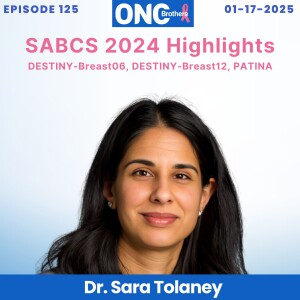
Friday Jan 17, 2025
Friday Jan 17, 2025
Join us for another insightful episode of the Oncology Brothers podcast as we dive into the latest breakthroughs in breast cancer research from the San Antonio Breast Cancer Symposium 2024. In this episode, hosts Drs. Rahul and Rohit Gosain are joined by Dr. Sara Tolaney from Dana-Farber Cancer Institute to discuss three pivotal studies:
1. DESTINY-Breast06 - An update on the efficacy of T-DXd in HER2 low and ultra-low breast cancer patients, highlighting its potential to change treatment paradigms for endocrine refractory disease.2. DESTINY-Breast12 - Exploring the robust intracranial activity of T-DXd in patients with brain metastases and its impact on quality of life.3. PATINA Trial - A groundbreaking study on the use of CDK4-6 inhibitors in combination with trastuzumab and pertuzumab for ER-positive, HER2-positive breast cancer, showcasing impressive progression-free survival rates.
Tune in as we unpack the implications of these studies for clinical practice and discuss the future of breast cancer treatment. Don't forget to like, subscribe, and hit the notification bell for more updates on oncology research and treatment strategies!
Follow us on social media:• X/Twitter: https://twitter.com/oncbrothers• Instagram: https://www.instagram.com/oncbrothers
For more information, visit our website: OncologyBrothers.com
#OncologyBrothers #BreastCancer #SABCS2024 #TDXD #PATINA #CancerResearch #Podcast

Wednesday Jan 15, 2025
Wednesday Jan 15, 2025
Welcome to another episode of the Oncology Brothers podcast! In this episode, hosts Rahul and Rohit Gosain are joined by Dr. Jame Abraham from the Cleveland Clinic to discuss key abstracts in the hormone receptor-positive breast cancer space from the San Antonio Breast Cancer Symposium 2024.
Episode Highlights:• EUROPA Trial: A phase 3 study comparing endocrine therapy versus radiation therapy in early-stage breast cancer patients over 70. Discover how the results may impact clinical practice and patient decision-making.• TAILORx Study: Updates on the benefits of anthracycline-based chemotherapy for patients with a recurrence score of 31 and above. Learn how this data influences treatment options for younger patients.• PADMA Study: Insights into the role of CDK4/6 inhibitors combined with endocrine therapy versus chemotherapy in aggressive disease settings. Understand why this combination remains the standard of care.• EMBER-3 Study: An exploration of the new oral selective estrogen receptor degrader, imlunestrant, and its promising results in combination with abemaciclib for patients with hormone receptor-positive, HER2-negative metastatic breast cancer.
Join us as we delve into these important studies and their implications for the future of breast cancer treatment. Don't forget to check out our other conference highlights from ASH 2024 and SABCS 2024!
Subscribe for more insights and updates in oncology!
Website: http://www.oncbrothers.com/
X/Twitter: https://twitter.com/oncbrothers
Contact us at info@oncbrothers.com
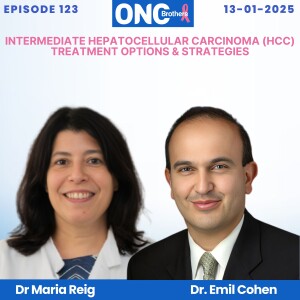
Monday Jan 13, 2025
Monday Jan 13, 2025
In the third of this 4-part podcast series on hepatocellular carcinoma (HCC), the Oncology Brothers, Drs. Rahul and Dr Rohit Gosain, are joined by hepatologist Dr. Maria Reig and interventional radiologist Dr. Emil Cohen to explore treatment strategies for patients with intermediate-stage HCC.
The experts share valuable insights into the available treatment options for this heterogeneous patient group and explore the role of systemic treatments and multimodal approaches in achieving optimal patient outcomes.
The conversation dives deep into real-world clinical challenges in managing patients with intermediate HCC, including treatment sequencing and strategies based on the experts' experience in clinical practice and the available data. The speakers also highlight variations in practice across different centres and geographic regions.
Website: http://www.oncbrothers.com/
X/Twitter: https://twitter.com/oncbrothers
Contact us at info@oncbrothers.com

Thursday Jan 09, 2025
Thursday Jan 09, 2025
Welcome to another episode of the Oncology Brothers podcast! In this episode, hosts Drs. Rahul & Rohit Gosain are joined by Dr. Laura Huppert from UCSF to discuss key highlights from the San Antonio Breast Cancer Symposium 2024.
We dive into three crucial studies:1. INSEMA Study: Explore the findings on the potential omission of axillary surgery in early-stage hormone receptor-positive breast cancer and its implications for patient quality of life.2. KEYNOTE-522 Update: Learn about the latest insights on the use of Pembrolizumab in triple-negative breast cancer, including the search for predictive biomarkers and the impact of achieving pathological complete response (PCR).3. OlympiA Study Update: Discover the updated results on the use of Olaparib in BRCA-positive patients, highlighting its significant benefits in invasive disease-free survival and overall survival.
Join us as we unpack these important studies and their implications for clinical practice. Don't forget to like, subscribe, and hit the notification bell for more updates from the Oncology Brothers!
Website: http://www.oncbrothers.com/
X/Twitter: https://twitter.com/oncbrothers
Contact us at info@oncbrothers.com

Tuesday Jan 07, 2025
Tuesday Jan 07, 2025
Welcome to another episode of the Oncology Brothers podcast! In this episode, hosts Drs. Rahul and Rohit Gosain are joined by Dr. Robert Orlowski from MD Anderson Cancer Center to discuss groundbreaking studies presented at ASH 2024 focused on multiple myeloma.
We dived into four key studies:1. AQUILA: Explore the impact of early intervention using daratumumab for smoldering myeloma, which showed improved progression-free survival (PFS) and overall survival (OS).2. Dara Based Quad Therapy: We discuss a meta-analysis reaffirming the use of quadruplet therapy with anti-CD38 for newly diagnosed multiple myeloma as the standard of care.3. CARTITUDE-4: study highlights the benefits of CAR-T therapy in earlier lines of treatment for patients with lenalidomide-refractory disease.4. Role of IVIG with BCMA Bispecific Antibodies: Discover how IVIG can reduce infection rates and improve overall survival when used alongside BCMA-targeted therapies.
Tune in for an insightful discussion that will enhance your understanding of the latest advancements in multiple myeloma treatment. Don't forget to check out our other episodes on CLL, myeloma, and lymphoma from ASH 2024!
Subscribe to the Oncology Brothers for more updates and expert insights in oncology!
Website: http://www.oncbrothers.com/ X/Twitter: https://twitter.com/oncbrothers Contact us at info@oncbrothers.com

Thursday Jan 02, 2025
Thursday Jan 02, 2025
Welcome to the Oncology Brothers podcast! In this episode, hosts Drs. Rahul and Rohit Gosain dive into the recent FDA approval of Zanidatamab, a bispecific HER2 antibody, for HER2 amplified, unresectable, locally advanced, or metastatic biliary tract cancer.Join us as we discuss the HERIZON-BTC-01 study with Dr. Shubham Pant, a GI medical oncologist at MD Anderson Cancer Center and one of the study's authors. We explore the significance of HER2 testing in biliary tract cancers, the study's design, key findings, and the implications for treatment strategies in the community oncology setting.
Key topics include:• Overview of biliary tract cancer and its treatment landscape• Study design and patient characteristics from the HERIZON-BTC-01 trial• Key findings, including overall response rates and duration of response• The importance of HER2 testing and its implications for treatment sequencing• Side effect profiles and management strategies for Zanidatamab• Future directions and ongoing clinical trials
Don't miss this insightful discussion that highlights the exciting advancements in HER2-targeted therapies for biliary tract cancer.Make sure to subscribe for more updates on recent FDA approvals, treatment algorithms, and conference highlights. We look forward to seeing you at GI ASCO 2025 in person!
Website: http://www.oncbrothers.com/
X/Twitter: https://twitter.com/oncbrothers
Contact us at info@oncbrothers.com

